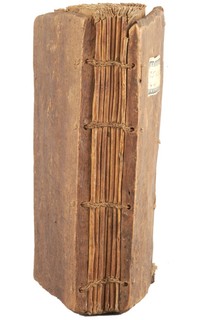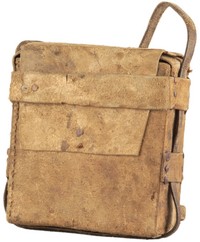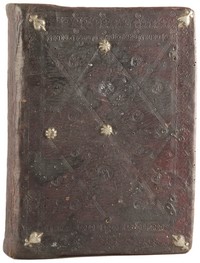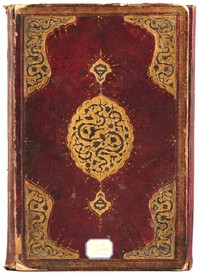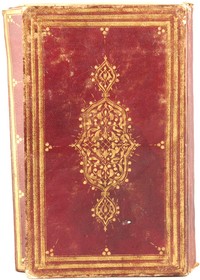The earliest method of sewing the codex book, sometimes called coptic binding,
in reference to its origin in North Africa, was an "unsupported" technique of chain stitching.
The sewing thread simply links to the previously sewn section of the textblock, forming a chainlike pattern
of stitches across the spine, rather than being sewn onto cords connecting the covers across the spine,
as with European books.
This sewing method was used for centuries in cultures around the eastern Mediterranean, the Islamic Near East, and in North Africa.
Ethiopic
| Title: | [Psalter, Canticles, Prayer of Moses, Song of Solomon, and Hymn in Praise of the Virgin, in Ge'ez]. |
| Date: | 19th cent. A.D. or before. |
| Location: | Manuscripts Divsion: Princeton Ethiopic Collection |
| Call number: | Princeton Ethiopic 38 |
| Dimensions: | 15 x 13 cm |
Ethiopic
| Title: | Anaphora of the Virgin Mary. Manuscript copy of the "Qeddase Maryam," attributed to Abba Heryagos (Cyriacus) of Behensa. |
| Date: | 17th cent. A. D. |
| Location: | Manuscripts Divsion: Robert Garrett Collection |
| Call number: | Garrett Ethiopic 32 |
| Dimensions: | 17.5 x 11.5 cm |
Ethiopic
Typical book satchel.
| Title: | Weddase 'Amlak: Praise of God: Prayers and Petitions for Seven Days of the Week. |
| Date: | 16th cent. A. D. |
| Location: | Manuscripts Division: Robert Garrett Collection |
| Call number: | Garrett Ethiopic 40 |
| Dimensions: | 14 x 13 cm |
Greek, fourteenth century
Greek manuscripts from the medieval period were often sewn with heavy thread recessed into slits across the textblock spine. Because this heavy thread caused the spine to swell, once the boards were attached the spine often had a rounded shape.
| Author: | John, Climacus, Saint, 6th cent. |
| Title: | Scala Paradisi [in Greek]. |
| Date: | Dated in Greek, 1396? |
| Location: | Manuscript Division: Robert Garrett Collection |
| Call number: | Greek Manuscript 16 |
| Dimensions: | 27 x 20 cm |
Turkish
Islamic manuscripts over many centuries have been sewn with a simple chain-stitch method, often with very thin thread. As this Ottoman binding shows, the resulting shape is a book with a flat and smooth spine.
| Author: | ,Seyh^i, ca. 1373-ca. 1422 |
| Title: | Haza Kitab-i Husrev ,Sirin. |
| Date: | Text composed 16th cent A.D.?. |
| Location: | Manuscript Division: Islamic Manuscripts Collection, Garrett Yahuda |
| Call number: | Garrett Yahuda 1439 |
| Spine height: | 25 cm |

